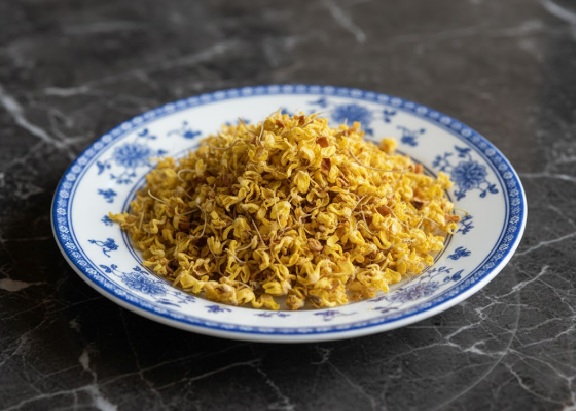Osmanthus Flower

Osmanthus Flower (Gui Hua): A Harmonizing Herb for the Lungs, Stomach, and Emotions
Introduction
Osmanthus Flower, known as Gui Hua (桂花) in Traditional Chinese Medicine (TCM), comes from the fragrant blossoms of Osmanthus fragrans Lour. Sweet, warm, and soothing, Gui Hua is valued for its ability to harmonize the Stomach, transform phlegm, and disperse cold. Its delicate floral aroma uplifts the spirit and eases emotional tension, making it a beloved ingredient in both herbal medicine and cuisine. Traditionally steeped in teas, wines, and desserts, Osmanthus Flower promotes comfort, digestion, and relaxation.
What Is Osmanthus Flower?
Gui Hua is a small, golden-yellow flower native to southern China, especially regions such as Guangxi and Zhejiang. In TCM, it is classified as warm and sweet, entering the Lung and Stomach meridians. The blossoms are dried after harvest and retain a soft, honey-like scent. In culinary and medicinal traditions, they are infused, brewed, or blended to support health and delight the senses.
Health Benefits of Osmanthus Flower
Relieves Cough and Transforms Phlegm
Gui Hua helps to soothe coughs caused by cold or phlegm accumulation. It warms the Lungs, loosens mucus, and is often used in herbal teas to ease throat discomfort and congestion.
Warms the Stomach and Eases Digestion
This gentle, warming herb supports the Stomach and helps alleviate indigestion, bloating, and abdominal pain caused by cold or stagnation. It can also help reduce nausea and motion sickness.
Dispels Cold and Promotes Circulation
Osmanthus Flower’s warming properties help disperse internal cold and mild stagnation of qi and blood, improving comfort and flexibility in cooler seasons.
Calms the Mind and Uplifts the Spirit
The natural fragrance of Gui Hua is considered emotionally harmonizing. It dispels sadness, reduces irritability, and promotes a sense of calm and well-being—making it popular in aromatherapy and relaxation teas.
Improves Skin and Detoxifies the Body
Gui Hua is believed to help clear toxins, support the body’s natural cleansing functions, and improve skin clarity. It is often added to teas that refresh breath and promote a glowing complexion.
How to Use Osmanthus Flower
In Herbal Preparations
Osmanthus Flower can be brewed alone or combined with herbs like Green Tea, Chrysanthemum, or Licorice Root. Use 1–2 teaspoons of dried blossoms per cup of hot water and steep for 5–10 minutes. It is also blended into herbal formulas for respiratory or digestive comfort.
In Daily Teas and Foods
Add a small spoonful of dried Osmanthus to green, oolong, or black teas for a floral aroma and gentle sweetness. In Chinese cuisine, Gui Hua is used to flavor congee, pastries, and sweet soups such as Osmanthus Jelly and Osmanthus Rice Cake. It is also infused in honey or wine to create fragrant condiments.
In TCM Formulas
Gui Hua appears in traditional formulas to harmonize the Stomach, clear phlegm, and improve respiratory comfort. It complements herbs like Chen Pi (Tangerine Peel) and Ban Xia (Pinellia) for transforming dampness and warming the middle burner.
Where to Buy Osmanthus Flower
You can find Gui Hua at:
- Chinese herbal shops and TCM pharmacies
- Asian grocery stores or tea markets (sold as “Sweet Osmanthus” or “Fragrant Olive”)
- Online retailers such as iHerb, Amazon, or ChineseHerbsDirect
Look for:
- Bright golden-yellow color with a rich, sweet fragrance
- Dry, loose blossoms without moisture or dark spots
- GMP-certified or pesticide-tested products for safety and purity
Are There Any Side Effects?
Osmanthus Flower is gentle and safe when used in moderate amounts. Because it is slightly warming, people with excessive internal heat or dryness should use it sparingly. Avoid overuse during pregnancy unless advised by a qualified practitioner.
Conclusion
Osmanthus Flower (Gui Hua) is a fragrant and harmonizing herb that supports the Lungs and Stomach while soothing the emotions and uplifting the spirit. Cherished in both TCM and culinary tradition, it offers warmth, comfort, and beauty—promoting clarity, calm, and gentle vitality in everyday life.
FAQs
Can I drink Osmanthus tea every day?
Yes. Osmanthus tea is mild and suitable for daily enjoyment, especially to soothe the throat and relax the mind.
Does Osmanthus Flower help with digestion?
Yes. It warms the Stomach, reduces bloating, and supports smooth digestion after heavy meals.
Can I mix Osmanthus Flower with other herbs?
Absolutely. It pairs beautifully with Green Tea, Goji Berries, Chrysanthemum, or Licorice Root for teas that harmonize the body and mind.

